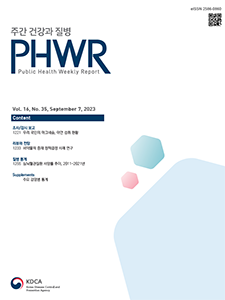Current Issue
Vol.16 No.35, September 07, 2023
-
Surveillance Reports 2023-09-07
 0
0
 698
698
 313
313
Dietary Magnesium and Zinc Intake among Koreans: Data from the 2021 Korea National Health and Nutrition Examination Survey
Jinyoung Park, Jieun Yang, Sihyun Park, Kyungwon Oh*
Public Health Weekly Report 2023; 16(35): 1221-1232 https://doi.org/10.56786/PHWR.2023.16.35.1 Abstract
AbstractThe purpose of this study was to determine the consumption of magnesium and zinc in the Republic of Korea. The food composition database for magnesium and zinc was developed based on the 2016–2021 Korea National Health and Nutrition Examination Survey (KNHANES). The 2021 KNHANES (VIII-3) was used to estimate the intake of magnesium and zinc among Koreans. The mean magnesium intake was 292.6 mg, which was 98% of their Recommended Nutrient Intake. The mean zinc intake was 10.1 mg, which was 123% of their Recommended Nutrient Intake. The proportion of those who consumed magnesium less than its Estimated Average Requirement (EAR) was 45% and it was the highest among 12–19 years old (≥60%). The proportion of those who consumed zinc less than their EAR was 27%, and it was the highest in 20s and 40s (≥30%). The major food sources of magnesium were grains, vegetables, and pulses, and those of zinc were grains, meats, and vegetables.
-
Review & Perspective 2023-09-07
 0
0
 1645
1645
 370
370
A Case Study on the Decision-making of Non-pharmaceutical Interventions
Ungki Jung, SangJune Kim, Youngook Jang, Jieun Aum, Dasol Kim, TongRyoung Jung
Public Health Weekly Report 2023; 16(35): 1233-1254 https://doi.org/10.56786/PHWR.2023.16.35.2 Abstract
AbstractTo cope with the coronavirus disease 2 019 (COVID-19) pandemic, non-pharmaceutical interventions (NPIs) policies were introduced around the world, with significant socioeconomic costs being simultaneously incurred. For the NPIs to be effectively implemented, public acceptance of them must be thus considered. In the process of incorporating scientific evidence into policy decisions, different interests, values, or beliefs among societal groups needs to be comprehensively discussed and deliberated. In this study, we focus on two dimensions of the contradictory dynamics that a relation between science and policy would give rise to: the politics of health policy and the politics of evidence. Based on the literature review and consultations from expert seminars we organized, comparative case analysis is employed to explore how decision-making on NPIs was made in the United States (US), the United Kingdom (UK), Denmark, and Taiwan. To be specific, science advice mechanisms are examined in the cases of the US and UK, while the use of behavioral science expertise in Denmark and how civic technology governance works in Taiwan are briefly discussed as policy innovations during the pandemic. We conclude with recommendations for Korean’s policymakers. They include risk communication strategies firmly based on behavioral and social science expertise and the activation of better science advice mechanisms.
-
QuickStats 2023-09-07
 1
1
 901
901
 360
360
Cardio-Cerebrovascular Disease Mortality Trends, 2011–2021
Public Health Weekly Report 2023; 16(35): 1255-1256 https://doi.org/10.56786/PHWR.2023.16.35.3

pp. 287~325
Most Keyword
?
What is Most Keyword?
- It is the most frequently used keyword in articles in this journal for the past two years.
Most Read
-
Management of Technology Development Efforts to Enhance the Healthcare Establishment’s Infection Response Capabilities
Misuk An, Hyeyoung Lee, Se-Jin Jeong, Hojin Lee, Sunkyung Baek
Public Health Weekly Report 2026;19: 1-12 https://doi.org/10.56786/PHWR.2026.19.1.1 -
Status and Future Tasks of the Regional Infectious Disease Specialized Hospital Establishment Project for Responding to Large-scale Emerging Infectious Disease Crises
Jeong-won Yeom, Hae-won Cho, Ju-hong Kim, Jong-hee Choi
Public Health Weekly Report 2026;19: 13-28 https://doi.org/10.56786/PHWR.2026.19.1.2
Editorial Office
+82-43-719-7569





 Full Text
Full Text Cite
Cite


